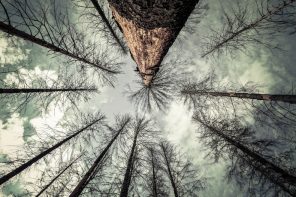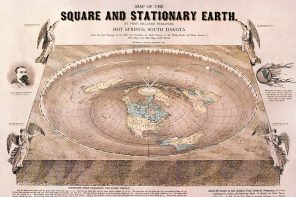10 Questions for Bron Taylor on Dark Green Religion: Nature Spirituality and the Planetary Future (UC Press, 2009)
What inspired you to write Dark Green Religion? What sparked your interest?
I have long been interested in grassroots social and environmental movements, and whether and to what extent religious perceptions and moral values motivates their participants. When working on an earlier book, Ecological Resistance Movements, I began to see that ideas that found fertile ground within grassroots environmental movements around the world were becoming increasingly influential. As I traveled around the world in the subsequent years, I encountered a fascinating and diverse set of examples that convinced me that something new and critically important was emerging that could decisively reshape the political, environmental, and religious landscape. I called this phenomena Dark Green Religion, and by this I mean religious (or religion-resembling) beliefs and practices that consider nature to be sacred and worthy of reverent care, and non-human organisms to be kin and as having intrinsic value.
What’s the most important take-home message for readers?
Religion and environmental ethics were transformed forever when on November 24, 1859, Charles Darwin’s On the Origin of Species was published. It shattered traditional religious explanations for the fecundity and diversity of the biosphere. Where this cognitive shift has been made, traditional religions with their beliefs in non-material divine beings are in decline. The desire for a spiritually meaningful understanding of the cosmos, however, did not wither away, and new forms of spirituality have been filling the cultural niches previously occupied by conventional religions. I argue that the forms I document in Dark Green Religion are much more likely to survive than longstanding religions, which involved beliefs in invisible, non-material beings. This is because most contemporary nature spiritualities are sensory (based on what we perceive with our senses, sometimes enhanced by clever gadgets), and thus sensible. They also tend to promote ecologically adaptive behaviors, which enhances the survival prospects of their carriers, and thus their own long-term survival prospects.
The biggest obstacle to the emergence of these new forms is the failure of the majority of humanity to recognize their absolute dependence on the earth’s living systems and that these ecosystems are declining rapidly almost everywhere. Without such recognition, ecosystems will continue to be rapidly degraded and the most likely outcome will be the collapse of the social systems that depend on these ecosystems. This collapse will involve increasing numbers of environmental refuges, and widespread social strife, as competition increases for scarce land, water, and calories. Under these circumstances, the struggle for survival will become paramount for most human beings, and they will prioritize their own survival and that of their closest relations. Under these conditions, it will be far less likely that there will be further, rapid, biocultural evolution toward kinship ethics, wherein people empathize with one another and the wider community of life, and act accordingly.
It often takes a crisis to dislodge deeply entrenched beliefs and practices (which are precipitating ecological and social collapse) and thereby, to create the soil for new modes of thinking and being. The coming crisis may finally convince people that they are not exceptional in the sense that they are exempt from natural laws, such as, that organisms that exceed the carrying capacity of their habitat experience decreasing fertility, increasing death rates, or both, until they no longer exceed their habitat’s carrying capacity. This realization may reinforce the emerging evolutionary-ecological worldview and the humility that tends to accompany it, and play a role in fostering dark green spiritualities and ethics, and concomitantly, a widespread sustainability revolution.
Anything you had to leave out?
Lots! I originally produced a 190,000-word manuscript because I simply needed to assimilate a host of experiences and data. I knew I would have to dramatically reduce the size before publication. After trimming lots of interesting material, I promised readers that I would supply additional examples and detailed explanatory notes at my Web site, and further illustrate the themes of the book with slide shows, music, video, internet links. I’m also working on a blog to facilitate discussion and debate.
What are some of the biggest misconceptions about your topic?
That ‘religion’ necessarily involves beliefs in non-material divine beings. Those who think such beliefs are the essence of religion would think it makes no sense to consider those with evolutionary-ecological worldviews as ‘religious.’ In contrast, I do not think it is particularly important to figure out exactly where the boundaries of what we call ‘religion’ might lie. I do think there is explanatory power in analyzing the religion-resembling aspects of diverse social phenomena, such as many characteristics of contemporary environmentalism, without getting too hung up on which labels for it are most apt.
In a nutshell, and thinking long-term, maybe very long-term, I think that in the future, what we know scientifically, through our senses, will provide the parameters within which most people will find their spiritual understandings (what they consider the ultimate nature of reality to be). These understandings will be the ground for feelings of reverence for the earth, and concomitant action to protect and restore her fecundity and resilience. In my view, without such biocultural evolution, there is no bright future for Homo sapiens on this planet because the planet itself will be biologically impoverished, far from the paradise our species knows we once enjoyed, as related in so many mythic, edenic, narratives.
Did you have a specific audience in mind when writing?
I work hard on writing accessibly for anyone interested in a topic, and insist on the same from authors in the editorial work I do, including in my Encyclopedia of Religion and Nature and the Journal for the Study of Religion, Nature and Culture. So, I am gratified when journalists compliment my writing by saying I do not write like an academic and academics say Dark Green Religion is a great read. This said, I have two main audiences in mind (1) scholars interested in emerging trends in environmental movements and politics who are trying to think critically about the future of religion and the ecosystems upon which we depend, and (2) people who have affinity with the forms of nature spirituality found in the book, who I think will appreciate knowing that they are apart of a powerful, global movement that is much more widespread than they likely have recognized.
Are you hoping to just inform readers? Give them pleasure? Piss them off?
I am, first and foremost, trying to illuminate phenomena and trends that few have noticed and fewer still understand in their religious, ethical, and affective complexity. Secondarily, I seek to let people who have affinity with dark green religion know they are like surfers who catch a wave early and far outside; they are cultural creatives who are making a far-reaching difference beyond their own immediate experience. Thirdly, by spotlighting what are, for the most part, salutary cultural developments, I hope to accelerate them. Although it is not my intent to annoy those with conventional religious understandings, few such religionists will welcome the evidence assembled in Dark Green Religion, or my supposition based on this evidence, that eventually their religions are likely to be supplanted by naturalistic forms of nature spirituality.
What alternate title would you give the book?
I love wordplay and double meanings, and thus the title. The ‘dark green’ captures both the sense of rich and deep, an environmental ethics in which all organisms have intrinsic value, as well acknowledges the perilous nature of any holistic ethics (whether religious or not): the needs and rights of individuals might be overridden in the interests of promoting some understanding of the common good. I take a hard look in the book at both the promise and peril of the phenomena under scrutiny.
How do you feel about the cover?
I am delighted with the cover because it integrated a photograph from Frans Lanting, a Dutch photographer and conservationist, whom I discuss in the book. This is but one example from the book wherein I discuss the important role that artists have played in expressing and promoting Dark Green Religion.
Is there a book out there you wish you had written? Which one? Why?
Not really, because my own work draws, often in subtle ways, on my favorite books. If had written those, I would not have had time to write my own! I especially value books, like Jared Diamond’s Guns, Germs, and Steel, which ask us to consider not only the way cultures lead to behaviors that transform environments but how environments shape human cultures, religions, and behaviors. Unfortunately, scholars too often remain in their disciplinary silos, and either consider culture or biotic evolution to be the decisive variables shaping our world. I highly value work that recognizes that nature and culture are in reciprocal production and we should attend to these reciprocal influences.
What’s your next book?
I am writing an ethnography focusing on radical environmentalism and thinking about a book on surfing (oceanic not internet), expanding on the chapter on aquatic nature religion in Dark Green Religion.




